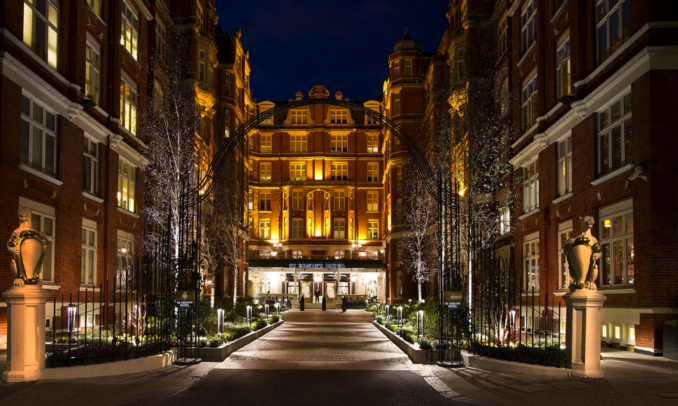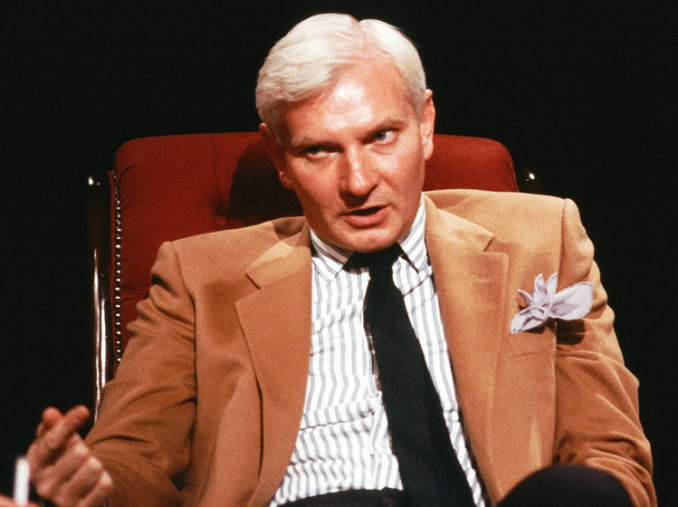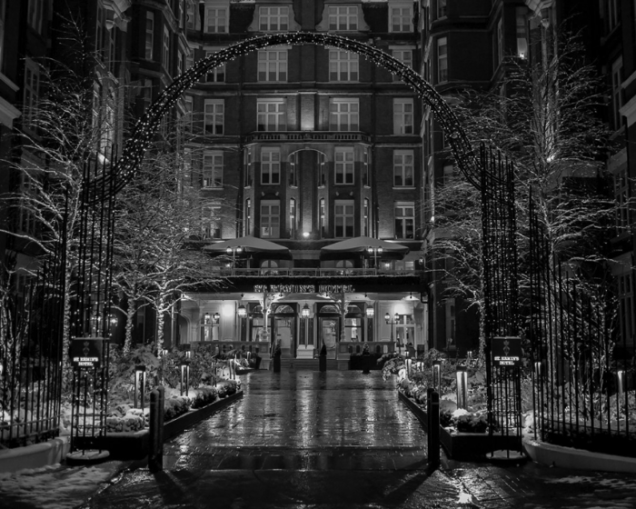
The newly restored, original garden courtyard entrance to the St Ermin’s Hotel, St James’s Park, London,
Tim Fordham-Moss – Licence CC BY-SA 2.0
St Ermin’s Hotel sits exactly, to the inch, halfway between Buckingham Palace and the Palace of Westminster. A four-star hotel and a Grade II listed late Victorian building, designed in the Queen Ann revival style, it was originally meant as a mansion block. Said to be the birthplace of the wartime Special Operations Executive and a former headquarters of some MI6 sections, it has also been used as an annexe for the likes of MI8, MI9 and GCHQ.
On Tuesday, 26th August 2015, the hotel’s Windsor meeting room, which holds 40 delegates, theatre style, was booked for a press conference. The speaker was former MP and convicted sex offender, Keith Harvey Proctor. The audience, the London press and TV news corps.
During the previous few weeks, speculation regarding VIP sexual abuse of children reached fever pitch with the Wiltshire Constabulary appealing for witnesses regarding the activities of former Prime Minister Edward Heath. Simultaneously, juries disbelieved the sworn evidence of High Court Judge Dame Elizabeth Butler-Sloss and Queen’s Counsel Kenneth Clarke MP in two separate sex abuse-related trials.
During the press conference, Proctor stood flanked by his solicitor at a pedestal emblazoned with ‘St Ermin’s Hotel’. The former MP for Billericay began his statement by claiming that he was entitled to be regarded as a private citizen having sought a private life since stepping down from Parliament at the election of 1987.
That private life ended on 4th March 2015 when an unidentified person made what Proctor labelled as “unfounded claims”. After expressing sympathy for victims of sexual abuse, Proctor wished the full weight of the law to be used against sex offenders and added that,
“Nobody, I repeat nobody is above the law.”
He reminded the press of what the whole country was talking about, claims of child sexual abuse against high profile figures, many of whom were dead.
On the 18th of June, at his request, Proctor had been interviewed by the police for six hours as part of Operation Midland. Midland had emerged from long-running Operation Fairbank, itself sparked by allegations of a high-level Westminster paedophile ring that had been made in parliament in October 2012 by the Labour MP Tom Watson. While speaking, Watson was protected by parliamentary privilege.

Harvey Proctor appearing on ‘After Dark’,
Open Media Ltd – Licence CC BY-SA 3.0
Proctor said that he had been vocal in his support for the police for many years. He was cooperating with this investigation. But in order to stop the drip, drip, drip of information being leaked into the media, he felt compelled to express his concerns about Midland, an operation which, he claimed, amounted to evidence given by one victim called ‘Nick’. He cast aspersions on the police’s competence even to the point of them getting his name wrong.
Proctor continued by outlining gruesome details from police documents listing Nick’s claims of violence, sexual violence and the murder of three boys. These were allegedly carried out by a group of VIPs at pool parties, central London townhouses, and locations such as Dolphin Square and the Carlton club.
To a soundtrack of clicking cameras, Proctor denied all allegations against him adding that he was a homosexual, not a paederast or paedophile. Having reminded the press that he pleaded guilty to four counts of gross indecency in 1987, he continued that those charges related to the age of consent, later lowered, making them no longer unlawful.
Regarding Midland, the police administered to Proctor a list of alleged coconspirators. He claimed that some he knew, some he had heard of but not met, and some he did not know.
These were: the late Leon Brittan, the late Ted Heath, Lord Janner (suffering from dementia), 92-year-old Lord Bramall, the late spies Maurice Oldfield and Sir Michael Hanley, a certain Ray Beech and General Sir Hugh Beach.
Proctor challenged any witnesses to place him with these people and specifically at the homes of Leon Brittan or Edward Heath.
“Come forward now.”
After running through recent legal developments and denying ever being present at the notorious Elm Guest House Proctor asked, what should happen next?
He insisted that he should be arrested and prosecuted not least to provide an opportunity to ridicule these allegations in court.
Otherwise, Nick should be stripped of his anonymity and prosecuted for wasting police time and perverting the course of justice. As should those who aided and abetted him.
Nick must be medically examined to make sure he was of sound mind and Superintendent Kenny McDonald should resign as head of Operation Midland or be sacked. An investigation should be launched into Midland, its cost and the detectives involved’s expense claims. Labour Members of Parliament misused parliamentary privilege and should apologise. If not so, challenged Mr Proctor, sue me for liable. Mr Tom Watson MP should state outside the Commons what he’d said within it. Lady Goddard (chair of the Independent Inquiry into Child Sex Abuse) should sift through Midland, an operation which, in turn, should be wound up.
Senior detective Sean Memory should explain why he made a statement in front of Heath’s Salisbury residence appealing for witnesses, say who told him to do so and resign.
The word ‘victim’ should be replaced with ‘complainant’. The police force should be overhauled with the recruitment of ‘super cops’ from other professions.
What happened to Proctor and others was a homosexual witch hunt led by paranoid police officers, the press, some politicians and a ‘ragbag of internet fantasists’.
After handing out copies of his statement Proctor took questions.
After a competent delivery of his statement, he wobbled a couple of times during the Q & A. He prevaricated over the nature of items taken from his property by the police in March 2015. He claimed that he hadn’t been in touch with the other alleged conspirators in the run-up to this press conference. Is that credible? Would he have outed Lord Bramall, General Beach and Greville Janner without their knowledge (possibly via their lawyers) given that up until then their names weren’t linked to Midland?
He was also caught out having stated in a radio interview that the coconspirators included generals before he now claimed to have been shown a list of the coconspirator’s names by the police. Proctor said that this information was in the public domain. When challenged by a journalist, he changed his story, saying that he was told by a ‘source’ prior to the radio interview. He refused to name this source, citing journalistic style confidentiality.

The Caxton Bar at the St Ermin’s Hotel, London, noted meeting place of London’s secret intelligence officers during, and since, WWII.,
Tim Fordham-Moss – Licence CC BY-SA 2.0
At first glance, Harvey Proctor, with his previous convictions for sex offences against young men and lurid tabloid stories of naked Arab boys under his bed in a North African hotel, might seem an unwise choice to lead the rebuttal of a police enquiry. But the other alleged conspirators were either dead (Ray Beech turned out to be Nick’s deceased father), suffering from dementia or elderly. Not only was General Sir Hugh Beach 90, but he had written some unhelpful comments when contributing to an Alisdare Hickson book, “The Poisoned Bowl”. In it, the general reminisced about sexual contact with numerous boys when a Winchester public schoolboy, stating this “did him no harm”.
However, Proctor’s statement proved effective. As an anonymous internet blogger noted at the time,
“By all means take the piss out of the grown-ups but take it a bit too far and they will get their own back. Probation officers, chauffeurs, police officers will be aware of the references. Journalists and their editors will be aware of the importance of these references.”
Maximum publicity had been focused upon the least credible of the enquiries (and Nick, the least believable of witnesses), from a venue at the heart of the establishment. On cue, various police operations began to crumble. Across a short period of time, evidence was adjudged unreliable while new witnesses failed to come forward.
Midland was wound down and abandoned early the next year. Sean Memory was investigated over ‘flirty texts’ to a murder victim’s relative and retired. By coincidence, MP Simon Danczuk, who had written a book about Westminster paedophile Cyril Smith, was suspended from the Labour Party in December 2015 over ‘flirty texts’ to a seventeen-year-old. Tom Watson left Parliament in 2019 and was refused a peerage. Exaro News, who had run the Nick story, closed in 2016.
Nick was revealed to be Carl Beech. As Proctor suggested, in 2019 Beech was prosecuted for perverting the course of justice and sentenced to eighteen years in jail. Although usefully referred to by media as a fantasist, Beech, a convicted paedophile himself, might better be described as a con man who put himself at the centre of allegations in order to claim compensation.
As for the items removed from Proctor’s property in March 2015. After the Beech verdict, the trial judge gave his reasons for not allowing the defence to admit the said items as evidence. In doing so, to an almighty silence from mainstream media, he listed them. According to the Freedom of Information Act Centre website, the inadmissible items kept from the jury included:
(DCJ/21) a school uniform and children’s underwear (aged 13-14yrs) bloodstained
(DCJ/22) school blazer
(DCJ/23) schoolwear stained
(DCJ/24) whips/ruler with blood
(DCJ/25/3) whip/crop
(DCJ/26) restraint with leather straps
On the 29th November 2019, the Metoplotain Police announced they were to pay Mr Proctor almost £900,000 in compensation and costs.
Acknowledgements
foiacentre.com
The Independent Newspaper
spotlightonabuse
Ukcolumn
Wiki

St Ermin’s Hotel,
R4vi – Licence CC BY-SA 2.0
The Goodnight Vienna Audio file
Audio Player



